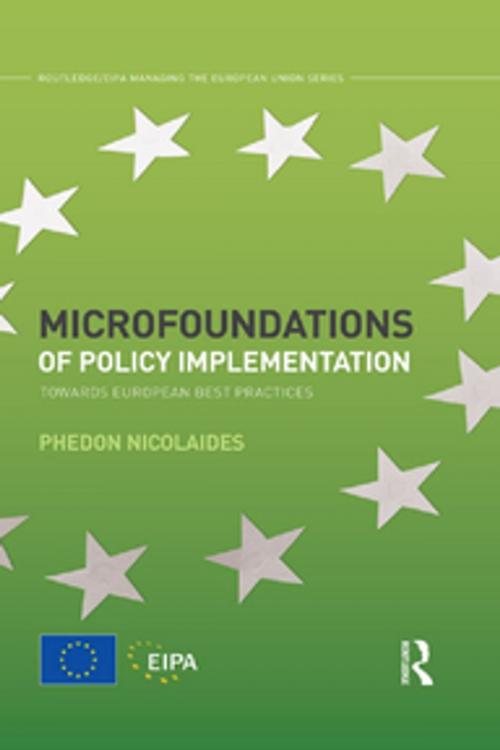Microfoundations of Policy Implementation
Towards European Best Practices
Nonfiction, Social & Cultural Studies, Political Science, Government, Public Affairs & Administration, Reference & Language, Reference| Author: | Phedon Nicolaides | ISBN: | 9781135017774 |
| Publisher: | Taylor and Francis | Publication: | January 4, 2013 |
| Imprint: | Routledge | Language: | English |
| Author: | Phedon Nicolaides |
| ISBN: | 9781135017774 |
| Publisher: | Taylor and Francis |
| Publication: | January 4, 2013 |
| Imprint: | Routledge |
| Language: | English |
The European Union (EU) has a compliance problem: there are persistent failures in the implementation of EU rules and policies by the member states. This book examines how policy implementation may be improved. It explains the nature of policy mistakes, proceeds to consider how individual public authorities and organizations can avoid making policy mistakes and then, in the light of its findings, derives how the EU may induce its member states and their public authorities to improve their compliance with EU rules and policies.
Basically, this is a book about how the right incentives at national level can improve institutional performance and contribute towards more effective application of EU rules across member states without having to confer new competences to the EU. Its premise is that strengthening the capacity of organizations to learn should not only lead to better performance, but should also stimulate useful policy experimentation across the EU.
Although this volume focuses on the obligations of EU membership and how to strengthen compliance, the proposed solutions have broader applicability. Improved organizational capacity for policy implementation will also be beneficial in those areas where the EU has no formal competence. Just as member states can learn from each other, so can policy officials in different policy fields. Good practices can spread.
The European Union (EU) has a compliance problem: there are persistent failures in the implementation of EU rules and policies by the member states. This book examines how policy implementation may be improved. It explains the nature of policy mistakes, proceeds to consider how individual public authorities and organizations can avoid making policy mistakes and then, in the light of its findings, derives how the EU may induce its member states and their public authorities to improve their compliance with EU rules and policies.
Basically, this is a book about how the right incentives at national level can improve institutional performance and contribute towards more effective application of EU rules across member states without having to confer new competences to the EU. Its premise is that strengthening the capacity of organizations to learn should not only lead to better performance, but should also stimulate useful policy experimentation across the EU.
Although this volume focuses on the obligations of EU membership and how to strengthen compliance, the proposed solutions have broader applicability. Improved organizational capacity for policy implementation will also be beneficial in those areas where the EU has no formal competence. Just as member states can learn from each other, so can policy officials in different policy fields. Good practices can spread.















